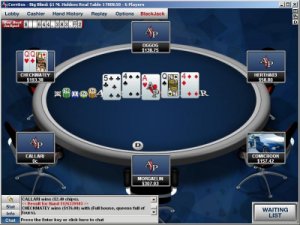Sentencing of Absolute Poker Co-Founder Brent Beckley Delayed

 A U.S. District judge filed an order on Friday indicating the court’s intent to consider an upward departure from the sentencing guidelines for Absolute Poker co-founder Brent Beckley. As such, Judge Lewis Kaplan of the United States District Court, Southern District of New York has pushed Beckley’s sentencing date to June 28 at 2:30pm.
A U.S. District judge filed an order on Friday indicating the court’s intent to consider an upward departure from the sentencing guidelines for Absolute Poker co-founder Brent Beckley. As such, Judge Lewis Kaplan of the United States District Court, Southern District of New York has pushed Beckley’s sentencing date to June 28 at 2:30pm.
An upward departure is a term used in criminal law to refer to an increase in the severity of a sentence above and beyond the standard sentencing guidelines. In the order, Kaplan wrote that there is “an aggravating circumstance in this case of a kind, or to a degree, not adequately taken into consideration by the Sentencing Commission in formulating the guidelines.”
He specifically cited a portion of the sentencing guideline manual that weighs the monetary loss amount very heavily and relies on the government’s ability to determine “the reasonably foreseeable pecuniary harm” of the offense. This means that government needed to figure out the potential financial harm that Beckley should have reasonably expected would result from his actions.
 Kaplan said the government isn’t in a position to determine that, but considering that Beckley knowingly broke U.S. law and conducted a business in which billions of dollars flowed in and out of his poker room, of which millions went into the coffers of Absolute Poker itself, “a case like this may warrant an upward departure.”
Kaplan said the government isn’t in a position to determine that, but considering that Beckley knowingly broke U.S. law and conducted a business in which billions of dollars flowed in and out of his poker room, of which millions went into the coffers of Absolute Poker itself, “a case like this may warrant an upward departure.”
In his December 20, 2011 plea agreement, Beckley pleaded guiltyto one count of conspiracy to violate the Unlawful Internet Gambling Enforcement Act and one count of conspiracy to commit bank fraud and wire fraud. When he appeared before Magistrate Judge Ronald Ellis in the U.S. District Court in Manhattan, Beckley admitted he knew he was violating U.S. laws. “I knew that it was illegal to deceive the banks,” he said.
The Black Friday indictment of Beckley and 10 other online poker principles read that Beckley “worked with and directed others to apply incorrect transaction codes to… internet gambling transactions in order to disguise the nature of those transactions and create the false appearance that the transactions were completely unrelated to internet gambling.”
 The U.S. sentencing guidelines take into account both the actual offenses and a defendant’s criminal history. The offenses are assigned an offense level on a scale of one to 43, which can be adjusted up or down based on factors laid out in the guideline manual. A person’s criminal history is categorized on a Roman numeral scale of I to VI.
The U.S. sentencing guidelines take into account both the actual offenses and a defendant’s criminal history. The offenses are assigned an offense level on a scale of one to 43, which can be adjusted up or down based on factors laid out in the guideline manual. A person’s criminal history is categorized on a Roman numeral scale of I to VI.
The two scores are then cross-referenced on a sentencing table to determine the recommended sentence. In Beckley’s case, both counts were considered closely related, so a single range was used based on whichever offense resulted in the higher level. The UIGEA count had a base level of 12 and the fraud count had a base level of seven, which was then increased to 12 because “a substantial part of the scheme took place outside the United States.” Thus, both counts had a level of 12.
That level was then adjusted upward by three levels because of Beckley’s managerial role in the crimes and adjusted downward two levels because Beckley took responsibility for his actions. Thus, the end level was 13. Because he had no prior criminal history, his criminal history category was I. An offense level of 13 and criminal category of I converge on the sentencing table to create a sentencing guideline of 12 to 18 months.
Because Kaplan felt that Beckley’s offenses might warrant a stiffer sentence, he has delayed sentencing until June 28. The defense team has until June 8 to make any submissions to argue against an upward departure, while the government has until June 18 to file any submissions it deems necessary.




